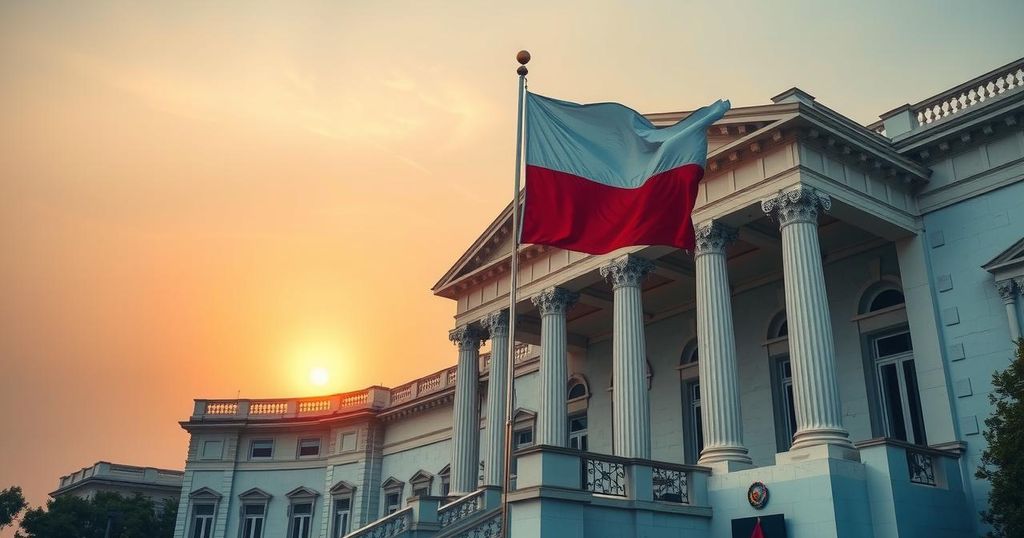World news
ASIA, BRAZIL, BROAD FRONT, CHINA, DEMOCRACY, FRONT, GOVERNANCE, INE, JOSE " PEPE " MUJICA, LACALLE POU, LEGISLATIVE PALACE, MEXICO, MONTEVIDEO, MU, NATIONAL STATISTICS AGENCY, NORTH AMERICA, OR, PEPE, POLITICS, REUTERS, SENATE, SOUTH AMERICA, TRADE RELATIONS, U. S, URUGUAY
Marcus Chen
0 Comments
Uruguay’s Political Shift to Center-Left with Yamandu Orsi’s Presidency
Yamandu Orsi has been inaugurated as Uruguay’s new center-left president, succeeding conservative Luis Lacalle Pou. His administration promises to address social welfare and economic concerns while continuing stable growth without raising taxes. Foreign policy will require careful navigation amidst global trade tensions, particularly concerning relationships with China and the United States.
Uruguay is witnessing a political transition to the center-left with the inauguration of Yamandu Orsi as the new president. Orsi, a 57-year-old former mayor and supporter of ex-President Jose “Pepe” Mujica, secured his position through a narrow victory over the current center-right coalition in the November elections. His approach is characterized by a commitment to a “modern left” agenda that seeks to harmonize social welfare and economic growth.
In his inaugural speech delivered at Montevideo’s Legislative Palace, President Orsi emphasized the beginning of a new phase focused on fresh proposals and ongoing development. Jointly celebrating his ascent to the presidency, he expressed gratitude to the outgoing conservative President Luis Lacalle Pou during a ceremonious outdoor event. Orsi campaigned emphasizing continuity and stability for the nation, which has a population of 3.5 million.
Although Uruguay’s economy is expected to experience steady growth, challenges such as high living costs, inequality, and violent crime have impacted the former president’s popularity. In an interview prior to his election, Orsi expressed the necessity for change, asserting that his coalition, the Broad Front, is positioned to effect that change. Notably, a report from the National Statistics Agency indicated that nearly 19% of Uruguayans experienced “multidimensional” poverty last year.
The new administration plans to prioritize support for the vulnerable populations while promoting economic growth without raising taxes. Furthermore, it must navigate complex international relations amid escalating global trade conflicts, particularly with the United States and China, which are significant trading partners for Uruguay.
Nicolas Saldias, an analyst at the Economist Intelligence Unit, highlighted that Uruguay will face pressure from the United States to limit Chinese investment in key areas such as infrastructure. As negotiations over a bilateral trade deal with China continue, the incoming government must skillfully manage its diplomatic engagements to align with U.S. strategic interests.
In addition to international challenges, President Orsi must also engage with the differing political landscapes of immediate neighbors, Brazil and Argentina. His administration has already demonstrated a break from previous foreign policy traditions, particularly concerning relations with Venezuela, reflecting the potential for a distinct approach in international dealings under his leadership.
In conclusion, Uruguay’s political landscape is shifting as Yamandu Orsi assumes the presidency, representing a return to center-left governance. His administration’s focus on social welfare, economic stability, and thoughtful international diplomacy indicates a proactive response to the challenges facing the nation. The new government’s ability to balance domestic needs with foreign relations will be pivotal in shaping Uruguay’s future.
Original Source: www.usnews.com




Post Comment